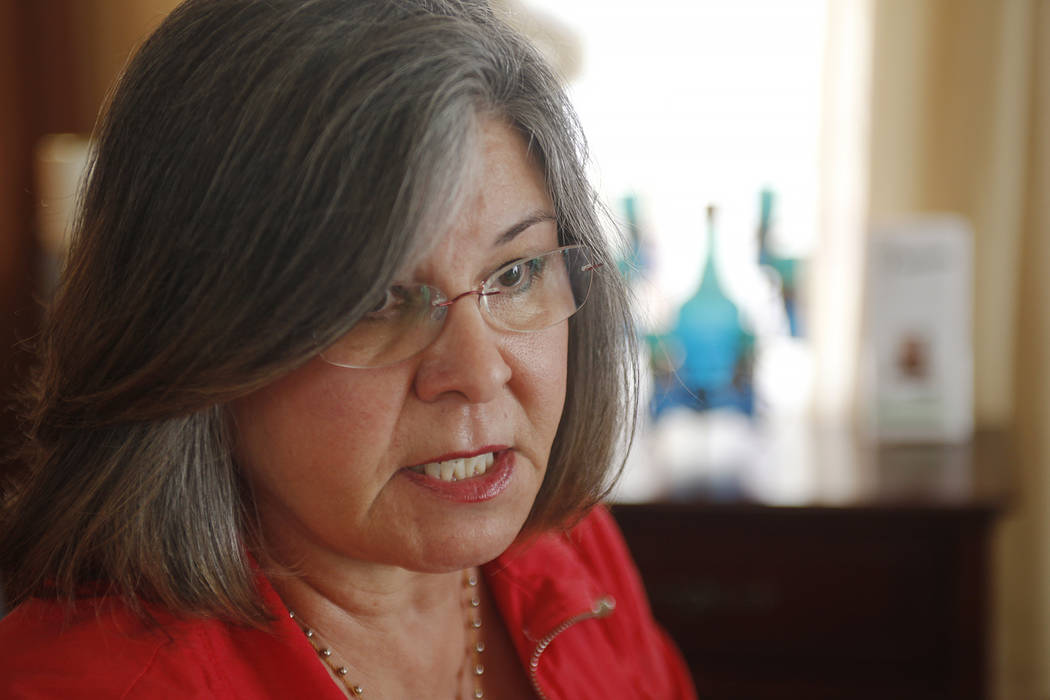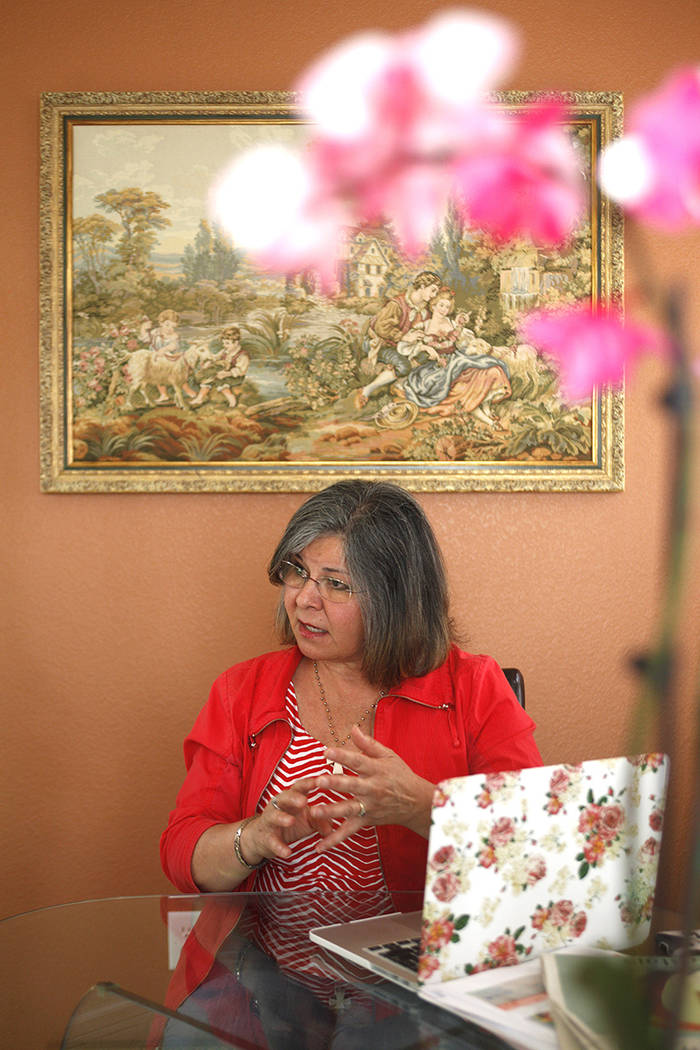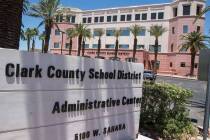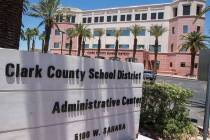CCSD’s draft policy on staff-student communications a good start, experts say
Draft rules on use of social media and other forms of electronic communication unveiled Wednesday by the Clark County School District are a good start, experts say, but there are other areas left unaddressed in the effort to tackle sexual misconduct between staff and students.
“It’s a reasonable start based on what I’ve read,” said Frederick Lane, a board member of the local Stop Educator Sexual Abuse, Misconduct and Exploitation group and author of “Cybertraps for Educators.” “They touch on a number of issues that I talk to school districts about all the time.”
Staff could only communicate with students on school topics through approved electronic systems, according to the draft policy and regulation. That may include applications or websites that publicly document such conversations.
Staff also could not use personal accounts of any type — including social media or email — to communicate with students “over whom they have direct contact, impact or control.”
In texting, staff would not be allowed to communicate with individual students — but they could communicate with groups of students. Electronic communications of all types would be prohibited between 10 p.m. and 5 a.m., except in an emergency.
But some other large school districts have additional safeguards — including a pre-written statement that teachers can use when students try to “friend” them on social media.
The draft policy and regulation was developed by a 27-member working group after a string of sexual misconduct cases involving CCSD employees and students. Since last July, 13 staff members have been arrested on various sex charges, an alarming trend explored in the Review-Journal’s recent three-part Broken Trust series. The working group included members of employee unions, the district attorney’s office, principals, administrators and the Clark County School District Police Department, but only one student and no parents.
The draft regulation also reiterates the already existing requirement that all employees pass a background check. They also would be required to obtain a district-issued badge before interacting with students. Administrators who allow people without a badge to have unsupervised contact with students could be disciplined.
Similar to other districts’ policies
The policy will bring the district more in line with other districts across the nation, Lane said. The time restriction on electronic communications and the requirement that staff only interact with multiple students are good policies that have been widely adopted, he said.
But Lane said he was concerned about how well the district would train educators on the policy and keep educators abreast of new social media platforms that are emerging.
“I do think that stuff moves very quickly and new opportunities and new ways of communicating between teachers and students keep coming up,” he said. “In the absolutely stunning speed of Internet communication, people lose sight of these things unless they are given emotional muscle memory. They need to have it drilled in through training.”
It is not yet clear what type of training the district would implement once a policy is adopted.
“The good news is that they are developing a policy,” said SESAME President Terri Miller. “That’s the good news. The bad news is it’s a little confusing in places.”
That includes the rules allowing texts to groups of students, she said.
Miller argued that there is never any need for staff to have the cell phone numbers of students. She noted there are other ways of communication, and remembered communicating with her daughter’s band teacher at Coronado High School through an online system off the school’s website.
“I don’t believe that it’s necessary to exchange personal numbers with students,” she said. “If they want to exchange personal numbers with parents, fine. But I don’t believe that students should have direct personal numbers of their teachers.”
Striking a balance
Members of the group that drafted the rules indicated there was good discussion on balancing technology with education.
“The challenge is making sure that you have the right policies in place so that that safety net is there,” said Desert Oasis High School Principal Kelly O’Rourke, who helped forge the draft. “But we also know that we want teachers and staff members to build healthy relationships with students.”
She said the group wanted to make sure that student-staff communication was in an open forum, involving broad conversations that encompass the whole class rather than just one student.
O’Rourke pointed to phone apps, such as Remind, that document exchanges on a separate platform.
“That’s a perfect example of an approved application, it keeps everyone safe,” she said. “You’re able to quote-unquote text, but it’s on a platform that is open to everybody.”

Las Vegas Review-Journal
Cheryl Davis, director of the district’s Family and Community Engagement Services division and another working group member, said she wanted to develop a policy that parents also understand. She also cited a provision that would require staff to report any suspicious behavior they see.
“It’s almost impossible for a principal, let’s say at a high school, to really know exactly 24-7 what teachers are doing,” she said. “So that’s why we thought we have to have things in place that made teachers responsible for their own actions — not just teachers, but also support staff.”
The public will be able to offer input on the draft rules at a roundtable at Chaparral High School on June 15, from 5:30-7:30 p.m. An online survey accessible at ccsd.net/protectourkids also is being used to collect feedback.
Contact Meghin Delaney at mdelaney@reviewjournal.com or 702-383-0281. Follow @MeghinDelaney on Twitter. Contact Amelia Pak-Harvey at apak-harvey@reviewjournal.com or 702-383-4630. Follow @AmeliaPakHarvey on Twitter.
Members of the internal working group
Tammy Malich, assistant superintendent, Education Services Division
Kirsten Searer, Office of the Superintendent
Andre Long, Human Resources
Meg Nigro, Human Resources
Celese Rayford, School associate superintendent
Cheryl Davis, Family and Community Engagement Services
Dan Wray, Technology Services
Jennifer Andricopulos, Technology Services
Lt. Dave Valenta, Sex Crimes Section, Las Vegas Metropolitan Police Department
Bill Garis, Clark County Association of School Administrators and Professional-Technical Employees
Kelly O'Rourke, principal, Desert Oasis High School
Debra Brown, teacher, Mojave High School
Kevin Child, trustee, Clark County School District Board of School Trustees
Vikki Courtney, Clark County Education Association
Sandy Ginger, Instructional Support and Student Activities
Kori Kloberdanz, Community and Government Relations
Donna Levy, Principal, Southwest Career and Technical Academy
Mitchell Maciszak, Clark County School District Police Department
Melinda Malone, Communications
Jon Okazaki, Office of the General Counsel
Jeanne-Marie Pochert Hanna, Office of the General Counsel
Pamela Sloan, Instructional Support and Student Athletics
Kenneth Young, Clark County School District Police Department
James Sweetin, chief deputy district attorney, Special Victims Unit, Clark County District Attorney's Office
Joseph Legat, Employee Management Relations
Megan Tuerke, Student Body president, Spring Valley High School
Jolene Bennett, Support Employee, Educational Opportunities Unit























